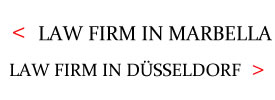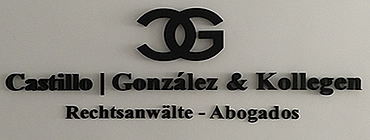- Düsseldorf
- |
- +49 (0) 211 - 163-751-76
- |
- CONTACT PER E-MAIL
- Marbella
- + 34 95 - 108-11-16
- |

- |

- |

Lawyer Real Estate Law Spain and German
We advise you comprehensively on real estate transactions - purchase contracts, donations, new construction declarations, rental contracts, loans and all kinds of real rights, such as mortgages - and are able to draw up and fully process corresponding contracts for our clients in Spanish. Due to our access to all Spanish land registry offices, we are able to obtain land register extracts, certificates and further information about Spanish real estate at short notice and at low cost.
This enables the ownership structure and loads on the property to be reliably determined. The spectrum of tasks of the law firm ranges from the entry of the documents signed by our clients in the land register to the submission of the corresponding tax returns to the payment of the respective tax on behalf of the client. The law firm can arrange for the regular payment of income and wealth tax to be paid annually in Spain for its clients.
Keep your eyes open when buying property in Spain
When buying Spanish property, it is important not to let yourself be blinded by the sun and sangria, but rather to consciously take this step with experienced and competent advisors, be it lawyers or tax advisors. Because even before the purchase of a Spanish property, qualified advice can save taxes that cause headaches if you buy without consideration, but at the latest when transferred to later buyers or subsequent generations. The initial euphoria quickly evaporates and the hangover spreads, in view of the tax burdens that the property owner or heir faces in the case of careless purchases.
Interesting facts about Spanish real estate law :
1. Basic information on buying property in Spain.
Spanish sales contracts for real estate are generally also in private writing, i.e. without a notarial deed. In theory, a Spanish property could be sold on the beer mat. However, entries in the land register require the previous notarial certification but, unlike in Germany, only have a declaratory effect. To buy / sell a Spanish property you need a tax number, for non-residents it is called NIE (Número de Identificación de Extranjeros). If non-residents are involved on the buyer or seller side, the Spanish regulations on money transactions between them must be observed. This is usually done by presenting a nominal bank check from a Spanish bank or by presenting an import certificate from Spanish customs. If non-residents are involved on both sides, it is sufficient if it is recorded in the certificate that payment has been made abroad. WARNING: Even with this type of purchase, the transfer of the purchase price must be proven. Unlike in Germany, Spanish notaries have less extensive information requirements when buying property. An entry in the land register must be made by yourself.
2. One-off costs when buying property in Spain :
Buyer:
Notary fees approx. 0.5 to 1.5% of the certified purchase price; Real estate transfer tax for sales between private individuals 7% of the assess. Purchase price otherwise 7% - 16% VAT (+ 0.5% document tax, 1% in the Balearic Islands), fees and costs for entries and gestorias approx. 0.5 to 1.5% of the assess. Purchase price.
Seller :
Value added tax between 16% and 30% of the increase in the value of the land on the caster. NOTE: This is mostly passed on to the buyer. Profit tax NEW 18% for non-residents (previously 35%) 3% advance payment on profit tax.
3. Current costs for property ownership by non-residents :
Municipal taxes (property tax 0.3% to 0.4% of the cadastral value, garbage disposal, etc.) property tax 0.2% to 2.5% of the property value, income tax 1.1,% to 2% of the cadastral value as the assessment basis and then 25% tax.
4. Tax saving models :
At this point, be warned of so-called intelligent tax-saving models, which are punishable tax evasion on closer inspection. For reasons of space, these should only be mentioned here and should remain uncommented:
Warning :
The following models are all punishable.
- Sub-securitization: A lower purchase price than actually paid is certified.- Fictitious purchase contract: Actually intended gift is disguised as a purchase contract.
- Postmortem power of attorney: heir does not disclose the testator's death and sells to himself .
- Transfer of SL shares without notification to the tax office.
5.Legal models:
There should now be mentioned tax-saving models that, on the one hand, legally, on the other hand, can lead to considerable tax savings if the German and Spanish tax law are optimally designed and exhausted:
6. Donation :
In Germany for the purchase of a property in Spain: Here the tax-free allowances of German tax law are exhausted, so that in Germany assets are transferred tax-free to the next generation.
NOTE: This model works best before buying the property.
Donation of money in Germany to buy property in Spain with usufruct order: As before, only the testator is granted usufruct so that the real financier keeps the scepter in hand. In addition, reduction of the taxable value.
7. Sale or purchase of a property by means of a Spanish SL, foundation or other legal entity :
WARNING:Transferred company shares must be reported to the tax office, as in the case of inheritance. Realize the tax saving effect only from a value of over 500,000 euros. Sale of a property to a German GmbH.
WARNING:This construction under company law can be rejected by the Spanish tax office as an abuse of tax regulations. Relocation to Spain. Only worthwhile if both parties (e.g. testator and heir) move to Spain. Reinvest the proceeds of a property sale in the purchase of a new property. It is only worthwhile if both properties are owner-occupied and the seller had registered the previous property as a permanent residence for at least 3 years before the sale.
Conclusion: With clever and forward-looking design, considerable tax savings can be achieved.
8. Our services:
- Apply for the Spanish tax number.
- Represent your interests at owner meetings.
- Register with all utilities (electricity, water).
- We accompany you legally when buying / selling your Spain property.
- Prepare all tax returns in the real estate transfer environment.
- Prepare the private contract and the notarial purchase / sales certificate.
: Our law firm in Düsseldorf & Marbella represents you throughout Europe :
We also represent you with your concerns and interests in other European countries. Our qualified and competent advice and representation in Spanish and German law means for us that we as German lawyers and Spanish Abogados represent your concerns in Alicante. And always with the necessary persistence and the necessary specialist knowledge and competence. Simply contact us and simply describe your concerns or interests to us.







